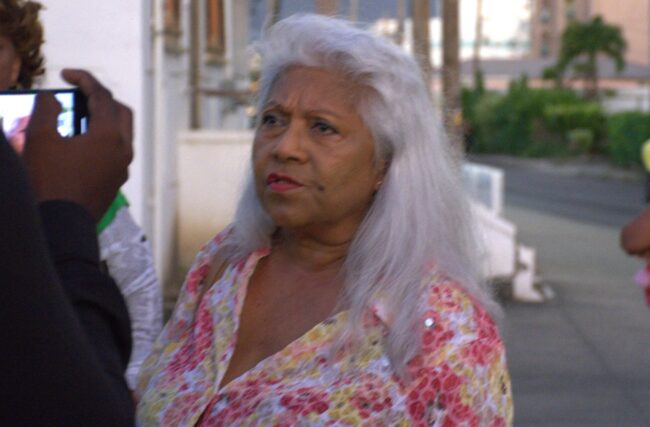
(Barbados Today) – Amid escalating tensions between Georgetown and Caracas, a former Guyanese diplomat who protested outside the Venezuelan embassy here has declared the situation as “nothing strange” to the Guyanese.
Despite drizzles and a low turnout, Tuesday’s demonstration at the Venezuelan Embassy in Hastings counted among their number Cita Pilgrim, who was Consul General to Barbados under the 2015-2020 David Granger administration.
Pilgrim expressed little surprise at the heightened tensions, citing recent developments in Guyana’s natural resources as a catalyst.
She told Barbados TODAY: “This will ignite that problem even further. And also given that [President Nicholas] Maduro himself has problems at home, it seems his purpose is to divert people’s attention to something that they have been brought up to believe is there they are.”

Pilgrim emphasised that the Venezuela perspective, ingrained in the public, contributes to the ongoing territorial dispute.
“The Venezuelan man in the street does not know any better because they have been brought up to believe that,” she said.
“Their maps include [the Essequibo and Berbice regions of Guyana], all of the land west of the Essequibo River, which it refers to as ‘Zona en Reclamación’ – ZR, which…means zone to be reclaimed. It is like that on their maps. So no, this is not a surprise to me.”
Caracas considers the oil-rich Essequibo region as its own because the region was within its boundaries during Spanish colonial times. Since gaining independence from Spain in 1811, Venezuela has alleged that its borders were drawn up unfairly in an act of international collusion.
Guyana has insisted on retaining the border of what was then British Guiana which was determined in Paris in 1899 by an arbitration panel, while claiming that Venezuela had agreed with the ruling until it changed its mind in 1962 – four years before Guyana obtained independence from Britain in May 1966.
Although the (controversy) is before the International Court of Justice (ICJ), Caracas said it does not recognise the court’s jurisdiction. The demonstration’s organiser, Stefan Newton, expressed satisfaction with the response to the hastily arranged protest and hailed the participants.

He told Barbados TODAY: “It was good. It was a last-minute protest action. Very quickly organised. I thank all of the persons in the Guyanese associations and Barbados for their support. I know a lot of persons are very hesitant to protest publicly but we applaud the small numbers that we’ve had tonight, and we thank them for taking time out on Tuesday afternoon to come out in protest.”
The protest aimed to raise awareness of Venezuela’s claims of two-thirds of Guyana’s territory as Caracas turned up the volume on its demand for the territory.
Despite an interim ICJ order prohibiting Venezuela from altering the status quo in the disputed area, Maduro’s government proceeded with a non-binding, “consultative” referendum, in which Venezuelans rejected the court’s ruling. But critics pointed to extremely low turnout for Sunday’s referendum.
In a referendum that the authorities in Caracas said won 95 per cent support, voters were asked whether to grant Venezuelan citizenship to Essequibo’s English-speaking inhabitants and convert the 61, 776 square miles of territory into a new Venezuelan state.
Reiterating the protesters’ stance, Newton said: “What we are standing for today is absolute support of Guyana. [We] unequivocally reject Venezuela’s claims over the land of Essequibo. And we call for the maintenance of the sovereignty of Guyana, and for any threat to the peace and security of the Caribbean region to cease because of Venezuela’s actions.”
The protest leader was also critical of Barbados’ stance on the issue, pointing to Prime Minister Mia Motley’s characterisation of Venezuela as a “good sister”.
“I do not think the comments were appropriate regarding what Venezuela is trying to do to Guyana,” Newton said as he urged a reversal of Barbados’ foreign policy, emphasising the need for immediate attention to the unfolding events between the two countries.






